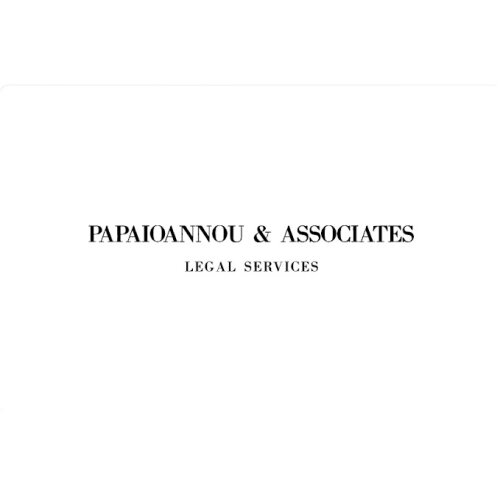Best Private Client Lawyers in Thessaloniki
Share your needs with us, get contacted by law firms.
Free. Takes 2 min.
List of the best lawyers in Thessaloniki, Greece
About Private Client Law in Thessaloniki, Greece
Private Client law in Thessaloniki, Greece, encompasses a broad spectrum of legal services tailored to individuals and families. These include estate planning, inheritance, wills, trusts, property management, tax planning, family law, and the administration of assets both in Greece and internationally. Thessaloniki, as the second largest city in Greece and a key economic center, has a thriving legal sector that assists both Greek nationals and expatriates with matters involving succession, asset protection, and compliance with Greek and EU regulations.
Given Greece’s unique legal system, which is grounded in civil law tradition, navigating the complexities of managing personal, family, and financial affairs requires specialized legal knowledge. Private Client lawyers in Thessaloniki combine their expertise in local and cross-border law to support clients in safeguarding their interests, ensuring legal compliance, and achieving peace of mind in their personal matters.
Why You May Need a Lawyer
There are several situations in which you may require the assistance of a Private Client lawyer in Thessaloniki:
- Drafting or updating a will to ensure that your estate is distributed according to your wishes under Greek law
- Navigating the Greek inheritance process, including accepting or renouncing inheritance, and dealing with Greek probate courts
- Transferring ownership of property or assets, especially if there are international elements such as foreign beneficiaries or assets abroad
- Managing trusts or establishing foundations for asset protection and succession planning
- Minimizing tax liabilities through legal tax planning strategies
- Dealing with family law matters, especially those involving divorce, child custody, and support, particularly where international borders are involved
- Resolving disputes arising from contested wills or inheritance rights
- Acting as a legal representative for minors or individuals lacking legal capacity
A Private Client lawyer can offer clarity on your rights and obligations, help prevent costly mistakes, and provide representation in negotiations or court proceedings.
Local Laws Overview
Greek Private Client law is primarily governed by the Greek Civil Code and various special statutes pertaining to inheritance, family law, taxation, and property. Some key aspects include:
- Forced heirship and inheritance law - Greek law ensures that certain heirs (such as children and spouses) cannot be entirely disinherited. A portion of the estate is reserved for them, limiting testamentary freedom.
- Wills - Wills must comply with specific formal requirements, and both handwritten and notarized wills are recognized under Greek law.
- Inheritance tax - Beneficiaries are subject to inheritance tax based on their relationship to the deceased and the value of assets received. There are tax-free thresholds and varying tax rates.
- Property ownership - There are strict procedures for property transfers, and foreign nationals must adhere to additional regulations, especially concerning real estate in border areas.
- Family law - Matters such as marriage, divorce, and child custody are regulated by local law, with specific requirements and procedures for each case.
- International aspects - Greece is bound by EU regulations, such as the EU Succession Regulation, which can affect cross-border inheritances for EU citizens.
Understanding these laws is crucial for effective estate and succession planning, as well as the management of international family affairs.
Frequently Asked Questions
What does a Private Client lawyer do in Thessaloniki?
A Private Client lawyer advises individuals and families on personal legal matters such as wills, estates, inheritance, tax planning, family law, and property matters. They help clients comply with local laws and represent them in negotiations or court.
Can a foreigner inherit property in Greece?
Yes, foreigners can inherit property in Greece. However, there may be specific regulations or restrictions based on nationality and the location of the property, especially in border regions.
How is inheritance distributed under Greek law?
Greek law mandates forced heirship, which means a portion of the estate is reserved for close relatives (children, spouse, and sometimes parents). The remaining part may be freely disposed of by will.
What happens if someone dies without a will in Greece?
If there is no will, Greek intestacy laws determine who inherits the estate. Typically, this includes the spouse, children, and other close relatives, according to a statutory order of succession.
Is Greek inheritance tax high?
Greek inheritance tax rates are progressive and depend on the beneficiary’s relationship to the deceased and the value of assets. Close relatives benefit from higher tax-free allowances and lower rates.
Can I make a will in my native language?
While a will can be drafted in another language, an official Greek translation may be required for legal recognition and probate proceedings in Greece.
What should I do if I am named executor of an estate?
As an executor, you are responsible for managing and distributing the assets of the deceased according to their will and Greek law. It is advisable to seek legal assistance to fulfill your responsibilities correctly.
Do I need a lawyer to buy or sell property in Thessaloniki?
While not legally required, engaging a lawyer is highly recommended to ensure compliance with all legal requirements, resolve title issues, and protect your interests during the transaction.
Are Greek court decisions on family law recognized abroad?
Many countries recognize Greek court decisions in family matters, especially within the EU. For enforceability outside Greece or the EU, additional legal steps may be required.
How can a Private Client lawyer help with tax planning?
A Private Client lawyer can advise on legal ways to minimize tax liabilities, manage your assets, and ensure compliance with Greek and international tax laws through estate planning and other strategies.
Additional Resources
If you require more information or assistance with Private Client matters in Thessaloniki, here are some helpful resources:
- The Thessaloniki Bar Association (Δικηγορικός Σύλλογος Θεσσαλονίκης) - Provides referrals and information on lawyers specializing in Private Client law.
- The Greek Ministry of Justice - Offers information on legal procedures, public notaries, and court systems.
- The Citizens’ Service Centers (KEP) - Help with administrative procedures and documentation for legal matters in Greece.
- Consulates and Embassies in Thessaloniki - Assist foreign nationals with legal matters involving their home countries and Greece.
- Local notary offices - Essential for the authentication of wills, property transfers, and estate matters.
- Tax Office (ΔΟΥ) - For information on inheritance and gift tax requirements.
Next Steps
If you believe you need legal assistance with a Private Client matter in Thessaloniki:
- Assess your issue and gather relevant documents such as existing wills, property titles, or family certificates.
- Contact the Thessaloniki Bar Association or seek recommendations for lawyers with expertise in your specific area of concern.
- Schedule a consultation to discuss your needs, ask about the lawyer’s experience with similar cases, and clarify the fee structure.
- Follow your lawyer’s guidance regarding documentation, court appointments, or administrative processes.
- Stay informed and maintain clear communication throughout your legal matter to ensure the best outcome.
Seeking timely legal advice will help you better understand your options, protect your interests, and navigate the intricacies of Private Client law in Thessaloniki, Greece.
Lawzana helps you find the best lawyers and law firms in Thessaloniki through a curated and pre-screened list of qualified legal professionals. Our platform offers rankings and detailed profiles of attorneys and law firms, allowing you to compare based on practice areas, including Private Client, experience, and client feedback.
Each profile includes a description of the firm's areas of practice, client reviews, team members and partners, year of establishment, spoken languages, office locations, contact information, social media presence, and any published articles or resources. Most firms on our platform speak English and are experienced in both local and international legal matters.
Get a quote from top-rated law firms in Thessaloniki, Greece — quickly, securely, and without unnecessary hassle.
Disclaimer:
The information provided on this page is for general informational purposes only and does not constitute legal advice. While we strive to ensure the accuracy and relevance of the content, legal information may change over time, and interpretations of the law can vary. You should always consult with a qualified legal professional for advice specific to your situation.
We disclaim all liability for actions taken or not taken based on the content of this page. If you believe any information is incorrect or outdated, please contact us, and we will review and update it where appropriate.
Browse private client law firms by service in Thessaloniki, Greece
Thessaloniki, Greece Attorneys in related practice areas.















